情态动词+完成时的语法意义(二)
高中英语知识点归纳情态动词和实义动词的辨析与用法总结
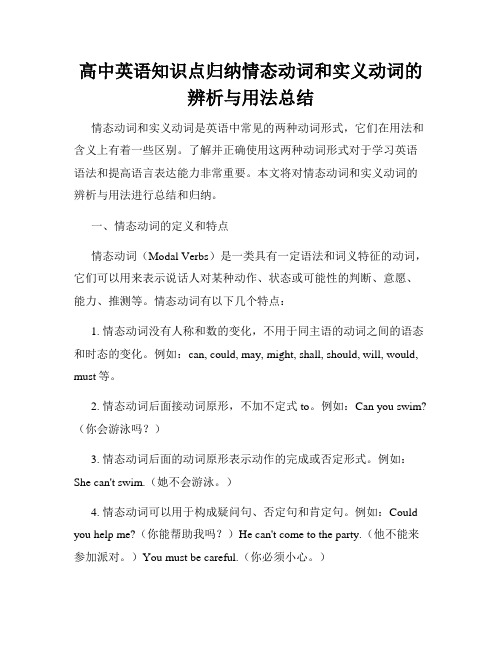
高中英语知识点归纳情态动词和实义动词的辨析与用法总结情态动词和实义动词是英语中常见的两种动词形式,它们在用法和含义上有着一些区别。
了解并正确使用这两种动词形式对于学习英语语法和提高语言表达能力非常重要。
本文将对情态动词和实义动词的辨析与用法进行总结和归纳。
一、情态动词的定义和特点情态动词(Modal Verbs)是一类具有一定语法和词义特征的动词,它们可以用来表示说话人对某种动作、状态或可能性的判断、意愿、能力、推测等。
情态动词有以下几个特点:1. 情态动词没有人称和数的变化,不用于同主语的动词之间的语态和时态的变化。
例如:can, could, may, might, shall, should, will, would, must等。
2. 情态动词后面接动词原形,不加不定式to。
例如:Can you swim?(你会游泳吗?)3. 情态动词后面的动词原形表示动作的完成或否定形式。
例如:She can't swim.(她不会游泳。
)4. 情态动词可以用于构成疑问句、否定句和肯定句。
例如:Could you help me?(你能帮助我吗?)He can't come to the party.(他不能来参加派对。
)You must be careful.(你必须小心。
)5. 情态动词在句中起到了"助动词"的作用,帮助说明说话人的意图、态度和推测等。
例如:You should study hard.(你应该努力学习。
)He must be at home.(他一定在家。
)二、实义动词的定义和特点实义动词(Main Verbs)是表达实际动作或状态的动词,它们具有人称和数的变化,可以接不定式、动名词、名词等作宾语,并且可以根据需要进行时态和语态的变化。
实义动词有以下几个特点:1. 实义动词可以根据主语的人称和数的不同进行变化。
例如:Iwalk to school.(我走路去上学。
情态动词用法归纳总结
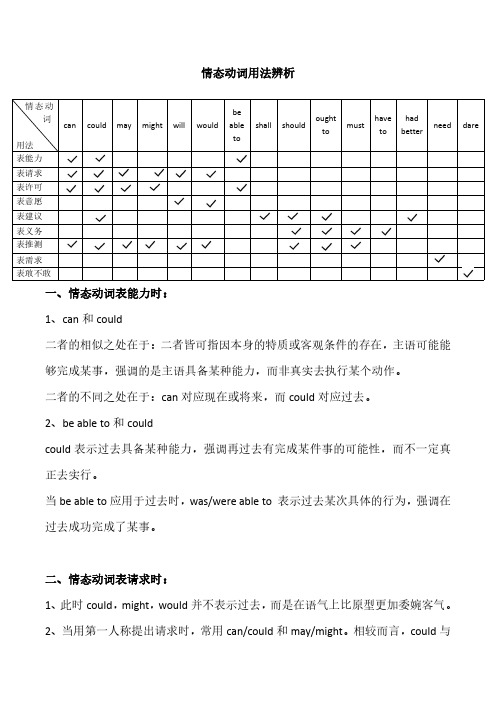
情态动词用法辨析情态动词用法can could may might will would be able to shall should ought to must have to had better need dare表能力表请求表许可表意愿表建议表义务表推测表需求表敢不敢一、情态动词表能力时:1、can 和could二者的相似之处在于:二者皆可指因本身的特质或客观条件的存在,主语可能能够完成某事,强调的是主语具备某种能力,而非真实去执行某个动作。
二者的不同之处在于:can 对应现在或将来,而could 对应过去。
2、be able to 和couldcould 表示过去具备某种能力,强调再过去有完成某件事的可能性,而不一定真正去实行。
当be able to 应用于过去时,was/were able to 表示过去某次具体的行为,强调在过去成功完成了某事。
二、情态动词表请求时:1、此时could ,might ,would 并不表示过去,而是在语气上比原型更加委婉客气。
2、当用第一人称提出请求时,常用can/could 和may/might 。
相较而言,could 与may在表请求的问句中出现的频率最高;might表发请求的语气最为委婉客气,因此反而很少见;而can则常用于熟人间的对话中。
语气强度:can>could/might>might3、当用第二人称提出请求时,常用can/could和will/would。
其中could和would 表达请求的语气更委婉客气;而can与will则常用于熟人对话中。
语气强度:can/will>could/would三、情态动词表许可时:1、与表请求不同,will/would不论前接第几人称,都表示主语本身的意愿,无需得到他人的“许可”,所以will/would不可以用于表请求的句中。
2、can和may二者都可以表示对现在或将来动作的许可,其中can的使用频率更高。
情态动词的情态与语气初中语法要点
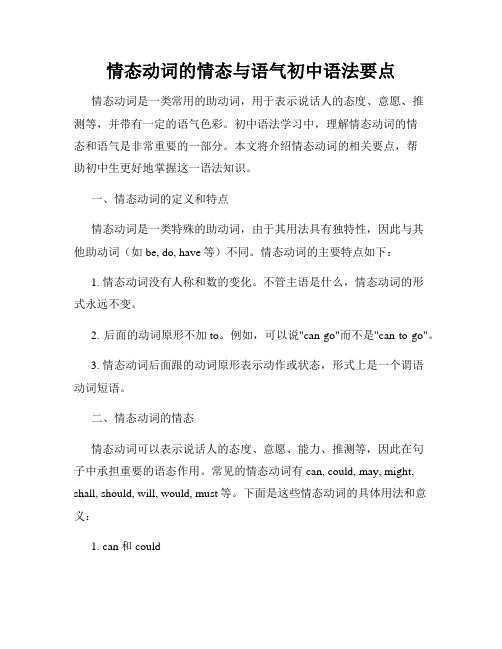
情态动词的情态与语气初中语法要点情态动词是一类常用的助动词,用于表示说话人的态度、意愿、推测等,并带有一定的语气色彩。
初中语法学习中,理解情态动词的情态和语气是非常重要的一部分。
本文将介绍情态动词的相关要点,帮助初中生更好地掌握这一语法知识。
一、情态动词的定义和特点情态动词是一类特殊的助动词,由于其用法具有独特性,因此与其他助动词(如be, do, have等)不同。
情态动词的主要特点如下:1. 情态动词没有人称和数的变化。
不管主语是什么,情态动词的形式永远不变。
2. 后面的动词原形不加to。
例如,可以说"can go"而不是"can to go"。
3. 情态动词后面跟的动词原形表示动作或状态,形式上是一个谓语动词短语。
二、情态动词的情态情态动词可以表示说话人的态度、意愿、能力、推测等,因此在句子中承担重要的语态作用。
常见的情态动词有can, could, may, might, shall, should, will, would, must等。
下面是这些情态动词的具体用法和意义:1. can和couldcan表示能够、会或有可能,could表示过去的请求、允许、推测或礼貌的提问。
例如:- I can swim.(我会游泳。
)- Could you pass me the salt?(你能给我递一下盐吗?)2. may和mightmay表示可能、可以,might表示对可能性的较弱推测或委婉的请求。
例如:- You may borrow my book.(你可以借我的书。
)- I think it might rain tomorrow.(我想明天可能会下雨。
)3. shall和shouldshall表示将要、必须,should表示应该、理应。
通常用于第一、第三人称的疑问句和建议句。
例如:- Shall we go swimming tomorrow?(我们明天去游泳好吗?)- You should take a break.(你应该休息一下。
情态动词的用法总结
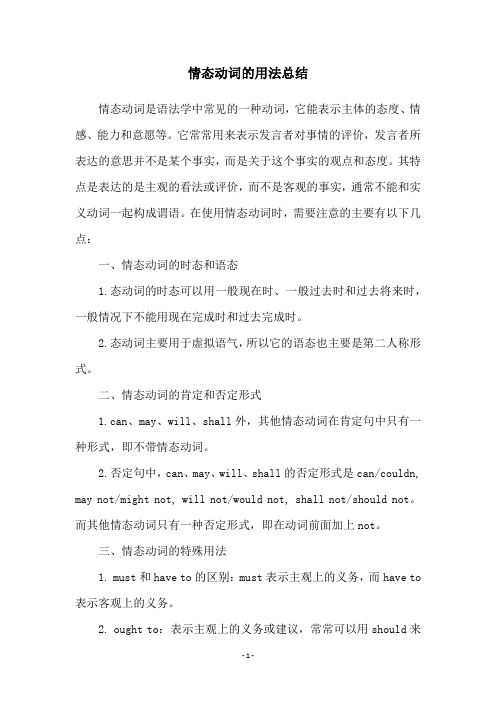
情态动词的用法总结情态动词是语法学中常见的一种动词,它能表示主体的态度、情感、能力和意愿等。
它常常用来表示发言者对事情的评价,发言者所表达的意思并不是某个事实,而是关于这个事实的观点和态度。
其特点是表达的是主观的看法或评价,而不是客观的事实,通常不能和实义动词一起构成谓语。
在使用情态动词时,需要注意的主要有以下几点:一、情态动词的时态和语态1.态动词的时态可以用一般现在时、一般过去时和过去将来时,一般情况下不能用现在完成时和过去完成时。
2.态动词主要用于虚拟语气,所以它的语态也主要是第二人称形式。
二、情态动词的肯定和否定形式1.can、may、will、shall外,其他情态动词在肯定句中只有一种形式,即不带情态动词。
2.否定句中,can、may、will、shall的否定形式是can/couldn, may not/might not, will not/would not, shall not/should not。
而其他情态动词只有一种否定形式,即在动词前面加上not。
三、情态动词的特殊用法1. must和have to的区别:must表示主观上的义务,而have to 表示客观上的义务。
2. ought to:表示主观上的义务或建议,常常可以用should来代替。
3. used to:表示一般过去某种状态,已不再存在。
4. be allowed to:表示被允许做某事。
5. be supposed to:表示应该做某事,但不一定要做;或者表示某事已经被认为是正确的或有意义的。
以上就是情态动词的用法总结,它们的功能及用法非常的重要,无论是作为口语考试,还是写作考试,情态动词都会被经常考查。
所以大家要把它们掌握牢固,在英语学习中能发挥出其最大的作用。
动词的种类和用法
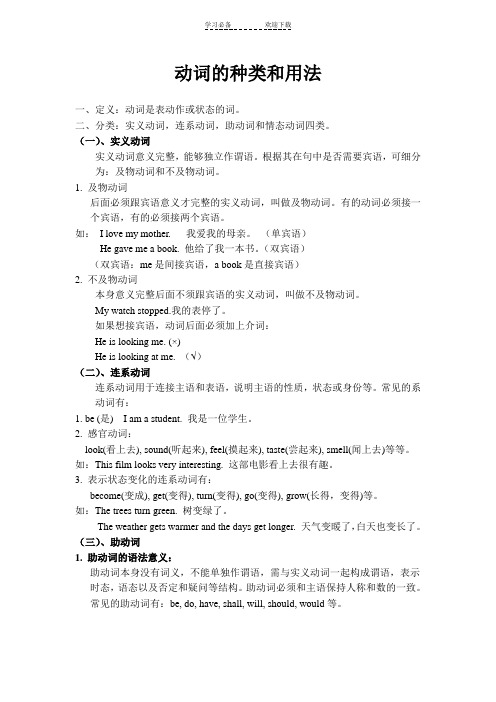
动词的种类和用法一、定义:动词是表动作或状态的词。
二、分类:实义动词,连系动词,助动词和情态动词四类。
(一)、实义动词实义动词意义完整,能够独立作谓语。
根据其在句中是否需要宾语,可细分为:及物动词和不及物动词。
1. 及物动词后面必须跟宾语意义才完整的实义动词,叫做及物动词。
有的动词必须接一个宾语,有的必须接两个宾语。
如:I love my mother. 我爱我的母亲。
(单宾语)He gave me a book. 他给了我一本书。
(双宾语)(双宾语:me是间接宾语,a book是直接宾语)2. 不及物动词本身意义完整后面不须跟宾语的实义动词,叫做不及物动词。
My watch stopped.我的表停了。
如果想接宾语,动词后面必须加上介词:He is looking me. (×)He is looking at me. (√)(二)、连系动词连系动词用于连接主语和表语,说明主语的性质,状态或身份等。
常见的系动词有:1. be (是) I am a student. 我是一位学生。
2. 感官动词:look(看上去), sound(听起来), feel(摸起来), taste(尝起来), smell(闻上去)等等。
如:This film looks very interesting. 这部电影看上去很有趣。
3. 表示状态变化的连系动词有:become(变成), get(变得), turn(变得), go(变得), grow(长得,变得)等。
如:The trees turn green. 树变绿了。
The weather gets warmer and the days get longer. 天气变暖了,白天也变长了。
(三)、助动词1. 助动词的语法意义:助动词本身没有词义,不能单独作谓语,需与实义动词一起构成谓语,表示时态,语态以及否定和疑问等结构。
助动词必须和主语保持人称和数的一致。
动词的分类及常见用法
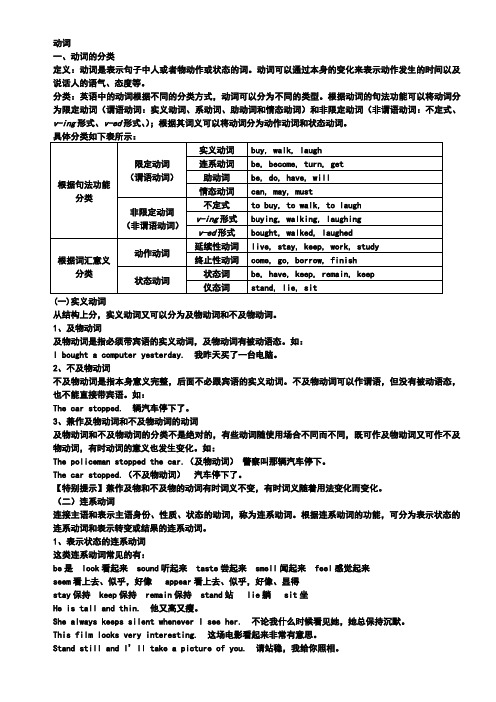
动词一、动词的分类定义:动词是表示句子中人或者物动作或状态的词。
动词可以通过本身的变化来表示动作发生的时间以及说话人的语气、态度等。
分类:英语中的动词根据不同的分类方式,动词可以分为不同的类型。
根据动词的句法功能可以将动词分为限定动词(谓语动词:实义动词、系动词、助动词和情态动词)和非限定动词(非谓语动词:不定式、v-ing形式、v-ed形式、);根据其词义可以将动词分为动作动词和状态动词。
(一)实义动词从结构上分,实义动词又可以分为及物动词和不及物动词。
1、及物动词及物动词是指必须带宾语的实义动词,及物动词有被动语态。
如:I bought a computer yesterday. 我昨天买了一台电脑。
2、不及物动词不及物动词是指本身意义完整,后面不必跟宾语的实义动词。
不及物动词可以作谓语,但没有被动语态,也不能直接带宾语。
如:The car stopped. 辆汽车停下了。
3、兼作及物动词和不及物动词的动词及物动词和不及物动词的分类不是绝对的,有些动词随使用场合不同而不同,既可作及物动词又可作不及物动词,有时动词的意义也发生变化。
如:The policeman stopped the car.(及物动词)警察叫那辆汽车停下。
The car stopped.(不及物动词)汽车停下了。
【特别提示】兼作及物和不及物的动词有时词义不变,有时词义随着用法变化而变化。
(二)连系动词连接主语和表示主语身份、性质、状态的动词,称为连系动词。
根据连系动词的功能,可分为表示状态的连系动词和表示转变或结果的连系动词。
1、表示状态的连系动词这类连系动词常见的有:be是 look看起来 sound听起来 taste尝起来 smell闻起来 feel感觉起来seem看上去、似乎,好像 appear看上去、似乎,好像、显得stay保持 keep保持 remain保持 stand站 lie躺 sit坐He is tall and thin. 他又高又瘦。
情态动词的用法与辨析

情态动词的用法与辨析情态动词是英语语法中的一类特殊动词,用于表示说话人的意愿、能力、推测、建议等含义。
本文将对情态动词的用法和辨析进行详细介绍。
一、情态动词的定义和特点情态动词(modal verbs)是英语中一类特殊的动词,它们用来表达说话人的情感、意愿、能力、推测或建议等态度。
情态动词具有以下几个特点:1. 情态动词没有人称和数的变化。
它们在不同的人称和数上保持不变。
2. 情态动词后面接动词的原形(即不带to的动词原型)。
3. 情态动词没有现在分词和过去分词形式,也没有第三人称单数形式。
4. 情态动词本身不带有完整的时态意义,而是通过上下文来表示所需要的时态。
常见的情态动词有:can、could、may、might、must、shall、will、would、should等。
二、情态动词的用法1. 表示能力和可能性情态动词can表示能力和可能性。
例如:- She can play the piano.(她会弹钢琴。
)- I can help you with your homework.(我可以帮你做作业。
)情态动词may和might表示可能性。
例如:- It may rain tomorrow.(明天可能下雨。
)- He might be in his office.(他可能在办公室。
)2. 表示允许和禁止情态动词can和could表示允许,而情态动词must和mustn't则表示禁止。
例如:- You can use my computer if you need it.(如果你需要的话,可以用我的电脑。
)- You mustn't smoke in this area.(在这个区域不准吸烟。
)3. 表示推测和可能性情态动词may和might还可以表示推测和可能性。
例如:- He may be busy right now.(他现在可能很忙。
)- It might snow tonight.(今晚可能下雪。
情态动词用法归纳总结

情态动词用法归纳总结情态动词是一类用来表示说话人的态度、观点和意愿的动词,具有一定的语法特点。
以下是情态动词的一些常见用法归纳总结:1.表示能力、可能性和推测:- Can: 表示能力和可能性,用于肯定句;例如:“I can swim.”(我会游泳。
)- Could: 表示能力和可能性,用于疑问句和否定句;例如:“Could you help me?”(你能帮助我吗?)- May/might: 表示可能性和推测;例如:“He may be busy.”(他可能很忙。
)- Must: 表示强烈的推测或肯定;例如:“He must be tired.”(他一定很累。
)2.表示许可和建议:- Can: 表示允许和禁止,用于肯定句;例如:“You can go now.”(你现在可以走了。
)- Could: 表示请求允许,用于疑问句和否定句;例如:“Could I borrow your pen?”(我可以借用你的笔吗?)- May/might: 表示请求允许;例如:“May I use your phone?”(我可以用一下你的手机吗?)- Should: 表示建议;例如:“You should eat more vegetables.”(你应该多吃蔬菜。
)3.表示义务和推测:- Must: 表示必须和义务;例如:“You must finish your homework.”(你必须完成作业。
)- Have to: 表示必须和义务;例如:“I have to go to work tomorrow.”(我明天必须去上班。
)4.表示可能性和意愿:- Can: 表示可能性和意愿,用于肯定句;例如:“I can help you with that.”(我可以帮你做那个。
)- Could: 表示可能性和意愿,用于疑问句和否定句;例如:“Could you please pass me the salt?”(请你把盐递给我好吗?)- May/might: 表示可能性和意愿;例如:“I may go to the party tonight.”(今晚我可能会去参加派对。
语法中的情态动词与虚拟语气的用法

语法中的情态动词与虚拟语气的用法在语法中,情态动词和虚拟语气都是重要的概念。
它们在句子中起到不同的作用,用法也各有特点。
本文将详细介绍情态动词和虚拟语气的用法,并指导读者如何正确运用它们。
一、情态动词的用法情态动词是英语中的一类特殊动词,包括can、could、may、might、shall、should、will、would、must等。
它们通常用来表达说话人的意愿、能力、推测、建议等。
1. 表示能力与可能性情态动词can和could常用来表示能力和可能性。
例如:"She can swim."(她会游泳。
)"I could understand the movie."(我能理解电影。
)在这些句子中,can和could表达了能力与可能性的概念。
2. 表示推测与可能性情态动词may和might用于表示可能性和推测。
例如:"It may rain tomorrow."(明天可能会下雨。
)"She might be late for the meeting."(她可能会迟到会议。
)在这些句子中,may和might表达了对未来事件的推测。
3. 表示义务与建议情态动词should常用于表示义务和建议。
例如:"You should take a break."(你应该休息一下。
)"We should recycle to protect theenvironment."(我们应该回收以保护环境。
)在这些句子中,should表达了建议和应该做的事情。
4. 表示意愿与请求情态动词will和would通常用于表示意愿和请求。
例如:"I will help you with your homework."(我会帮你做作业。
)"Would you please pass me the salt?"(请你递给我盐吗?)在这些句子中,will和would 表达了说话人的意愿和请求。
语法之情态动词的用法

语法之情态动词的用法情态动词是英语中一类重要的动词形式,它们用于表示说话人对某种动作、状态或行为的态度、意愿、能力等。
掌握情态动词的用法对于学习英语语法和提高语言表达能力都十分关键。
本文将详细介绍情态动词的定义、常见用法以及注意事项。
一、情态动词的定义情态动词(Modal Verbs),也称为情态助动词,是一类特殊的助动词,用来修饰动词,表示说话人的情态态度、意愿、能力等。
情态动词在句子中通常与动词原形连用,没有人称和数的变化,也没有时态的变化。
二、情态动词的常见用法1. 表示能力与能力的强弱情态动词常用于表示某人在某方面有或没有能力。
例如:- She can swim.(她会游泳。
)- He could play the piano when he was young.(他年轻时会弹钢琴。
)- They can't speak French.(他们不会讲法语。
)2. 表示允许与禁止情态动词也可用于表示允许或禁止某种行为。
例如:- You may use my computer.(你可以用我的电脑。
)- You mustn't smoke here.(你不能在这里抽烟。
)3. 表示推测与可能性情态动词可以用来表达说话人对某种情况的推测或可能性。
例如:- She might be at home.(她可能在家。
)- It could rain later.(可能会下雨。
)4. 表示请求与建议情态动词也可以用来表示请求或给出建议。
例如:- Could you please pass me the salt?(你能帮我递一下盐吗?)- You should go to the doctor if you don't feel well.(如果你感觉不舒服,应该去看医生。
)5. 表示义务与必要性情态动词还可以表示义务和必要性。
例如:- Students must wear uniforms at school.(学生在学校必须穿校服。
情态动词知识点

情态动词知识点情态动词是英语中一类特殊的动词,用于表示说话人对某种动作或状态的态度、判断、推测或许可等。
它们在句子中往往与动词原形搭配使用,并起到修饰动词的作用。
情态动词在语法和用法上有一些特殊之处,下面将介绍情态动词的基本知识点。
一、情态动词的定义与种类情态动词是一类特殊的动词,用于表示说话人对某种动作或状态的态度、判断、推测或许可等。
常见的情态动词包括can, could, may, might, must, shall, should, will, would等。
它们都没有人称和数的变化,并且后面一般接动词原形。
二、情态动词的用法1. 表示能力或可能性例如:He can swim.(他会游泳。
)They may arrive early.(他们可能会早到。
)2. 表示许可或能力例如:Can I borrow your pen?(我能借用你的笔吗?)You may go now.(你现在可以走了。
)3. 表示推测或可能性例如:She might be busy.(她可能忙。
)They should arrive soon.(他们应该很快会到。
)4. 表示义务或建议例如:You must finish your homework.(你必须完成作业。
)We should recycle.(我们应该回收。
)5. 表示意愿或请求例如:I will help you.(我会帮你的。
)Would you please close the window?(你能请关窗户吗?)三、情态动词与时态的搭配情态动词本身没有时态,它们与后面的动词共同表达时间和语态的变化。
一般情况下,情态动词后面接动词原形,表示动作或状态的不同时间和语态变化由后面的动词来表达。
例如:- He can play the piano.(他会弹钢琴。
)- He could play the piano.(他过去会弹钢琴。
)- He will be able to play the piano.(他将来会会弹钢琴。
成高辅导语法3-助动词、情态动词、非谓语动词
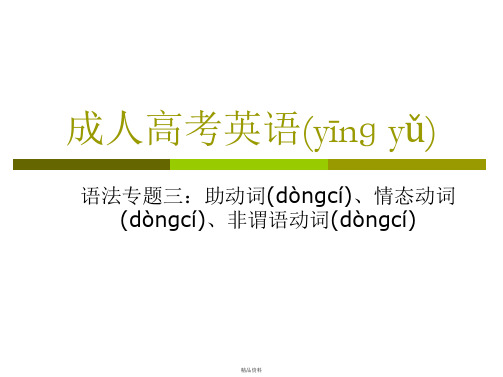
表示过去应该做某事而没做
精品资料
练 习: I was caught in a heavy rain. I __(_B_)__
1. —Where will you start your work after graduation, in the south or in the north?
— Mm, it’s not been decided yet. I __(_D_)__
continue my study for a higher degree.
— It _(_A_)_ be your younger brother. A. must B. shall C. will D. would
精品资料
例2:—Mom, do I have to go to bed now?
—Yes, you ___(D__). A. can B. will C. may D. must
意义: 情态动词时一种(yī zhǒnɡ)本身有一定词义,但
要与动词原形或其被动语态一起使用,给谓语动词 增添情态色彩,表示说话人对有关行为或事物的态 度和看法,认为其可能、应该或必要等。
精品资料
例1: — Who do you think has made my
room so dirty, mum?
-我应该把发生的事情(shì qing)告诉给班主任吗? -不行,你不能。李老师会非常生气
精品资料
3. Jim went to his hometown yesterday. He
必修三unit2语法讲解情态动词用法(最新整理)
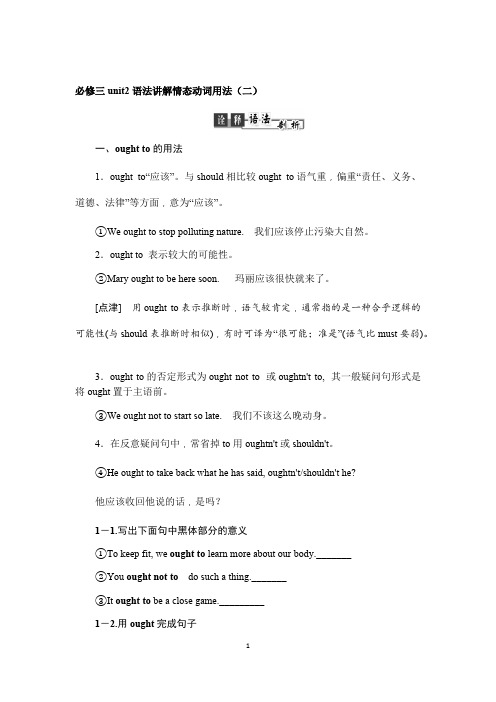
必修三unit2语法讲解情态动词用法(二)一、ought to的用法1.ought to“应该”。
与should相比较ought to语气重,偏重“责任、义务、道德、法律”等方面,意为“应该”。
①We ought to stop polluting nature. 我们应该停止污染大自然。
2.ought to 表示较大的可能性。
②Mary ought to be here soon. 玛丽应该很快就来了。
[点津] 用ought to表示推断时,语气较肯定,通常指的是一种合乎逻辑的可能性(与should表推断时相似),有时可译为“很可能;准是”(语气比must要弱)。
3.ought to的否定形式为ought not to 或oughtn't to, 其一般疑问句形式是将ought置于主语前。
③We ought not to start so late. 我们不该这么晚动身。
4.在反意疑问句中,常省掉to用oughtn't或shouldn't。
④He ought to take back what he has said, oughtn't/shouldn't he?他应该收回他说的话,是吗?1-1.写出下面句中黑体部分的意义①To keep fit, we ought to learn more about our body._______②You ought not to do such a thing._______③It ought to be a close game._________1-2.用ought完成句子④你不该责备他。
You ____________(scold )him.⑤我明天该动身吗?—______________(_leave )tomorrow?是的,你应该。
—Yes, you_ought_to.⑥我们现在应该走,是吗?We ought to go now, ____________?二、have to, don't have to与mustn't的用法1.have to(口语中常用have got to)表示客观需要做的事情,意为“必须;不得不”。
情态动词和虚拟语气讲解

情态动词和虚拟语气一、命题趋势高考中,短文改错和语法填空主要以情态动词误用,情态动词后实意动词的形式错误或时态错误等考察对情态动词和虚拟语气的理解和运用。
二、考纲内容1.熟悉情态动词常见的意义、作用、用法及变化形式;了解情态动词与进行时、完成时连用时所表达的意义。
2.熟悉非真实条件虚拟语气的形式、意义;了解虚拟条件的省略及混合虚拟条件语气;了解名词性从句、方式状语从句中的虚拟语气情况。
三、情态动词(一)情态动词1.情态动词的概述情态动词主要用以表明说话者对某一行为的态度和观点,主要包括揣测、判断、需要、可能、各种意愿等。
2.情态动词的特征(1)有一定的词义,但不能单独作谓语。
他们要和动词原形一起构成谓语。
(2)适用于主语的各种人称和数(have to 例外,当其主语是第三人称单数时用has to。
)(3)后接动词原形。
(二)情态动词的用法1.can, could(1)表示能力:can表示现在的能力,could表示过去的能力。
例:Although he is only four, he can play the piano.(2)表示请求:could 不表示过去,只表示客气、委婉的口气,但回答时必须用can.例:--Could I borrow your bicycle?--Yes, you can/ No, you can’t.(3)表示可能行:一般用在否定句和疑问句中,could也可用于肯定句。
例:That can not be Mary, for she is in hospital.注意:can有时也用于肯定句,表示理论上的可能性或一时的情况,常译为“有时会”。
例: Mother can be very forgetful sometimes.辨析: can与be able to(1)表示能力时,can与be able to意义相同,但是can仅用于一般现在时及一般过去时,be able to可用于更多时态。
动词详解3

评了。 A bridge should be built here. 这儿应该建座桥。
现在时
过去时
将来时
语态
主动语态
一般时
完成时
进行时
被动语态
以I clean the house为例
I clean the house.
I cleaned the house yesterday.
一般现在时(第三人称单数加 s)
一般过去时(v-ed,见表格)
I will clean the house
将来完成时(will have done)
过去将来时(would do/ was/were going to do)
过去将来完成时(would have done, “本想做但并 未做” )
以I clean the house为例
I have been cleaning the house for 3 hours.
house at this time
tomorrow.
将来进行时(will be doing)
以I clean the house为例
I have cleaned the house for 3 hours.
I had cleaned the house before I cooked.
I will have cleaned the house by 10 tonight.
tomorrow.
一般将来时(will/be going to
I am cleaning the house. do)
I was cleaning the house at this time yesterday. 现在进行时(be doing)
小学英语语法详解动词(2)——助动词和情态动词

小学英语语法详解动词(2)——助动词和情态动词助动词和情态动词三、助动词助动词协助主要动词构成谓语动词词组,是语法功能词,自身没有词义,不可单独使用。
最常用的助动词有:be, have, do, will, shall, should等,它们表示不同的时态和语态。
其中be、do、have 是最基本的,它们没有词汇意义,只有语法作用,如协助构成进行体、完成体、被动态、否定句和疑问句等。
1.表示时态He is dancing.他在跳舞。
He has gone to London.他已去了伦敦。
2.表示语态The letter was sent to England.信被寄往英国。
The dog is lost.小狗被弄丢了。
3.用作构成疑问句Do you like coffee?你喜欢咖啡吗?Did you father have dinner with you?你父亲和你一起吃晚饭了吗?4.与否定副词not合用,构成否定句I don’t ike him.我不喜欢他。
He didn’t catch the bus.他没有赶上车。
5.加强语气In fact, I do weep a little.实际上,我的确哭了一会儿。
I do love you.我确实很爱你。
6. shall 和 will 的助动词用法1)shall 和 will 作为助动词可以与动词原形一起构成一般将来时I shall write a letter to my grandmother.我将给我的祖母写一封信。
He will go to Sydney.他要去悉尼。
2)shall 在疑问句中,用于第一人称比较多,用来征求对方意愿Shall I turn on the light?我可以把灯打开吗?Shall we go shopping?我们去购物好吗?四.情态动词情态动词本身有一定的词义,表示说话人对有关行为或事物的态度和看法,认为其可能、应该或必要等。
高考英语冲刺情态动词的意义与用法
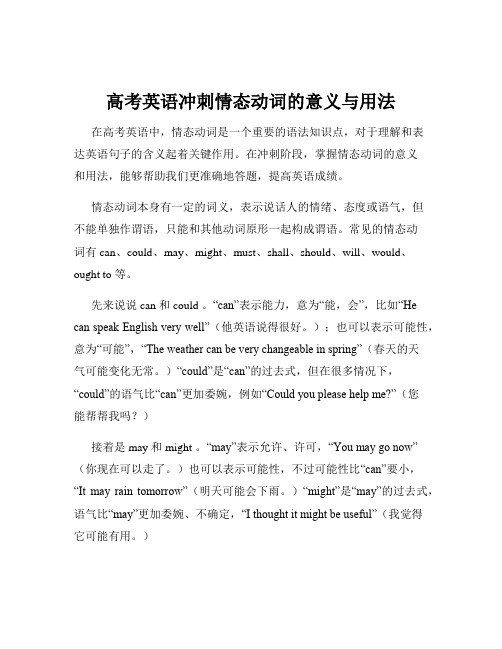
高考英语冲刺情态动词的意义与用法在高考英语中,情态动词是一个重要的语法知识点,对于理解和表达英语句子的含义起着关键作用。
在冲刺阶段,掌握情态动词的意义和用法,能够帮助我们更准确地答题,提高英语成绩。
情态动词本身有一定的词义,表示说话人的情绪、态度或语气,但不能单独作谓语,只能和其他动词原形一起构成谓语。
常见的情态动词有 can、could、may、might、must、shall、should、will、would、ought to 等。
先来说说 can 和 could 。
“can”表示能力,意为“能,会”,比如“He can speak English very well”(他英语说得很好。
);也可以表示可能性,意为“可能”,“The weather can be very changeable in spring”(春天的天气可能变化无常。
)“could”是“can”的过去式,但在很多情况下,“could”的语气比“can”更加委婉,例如“Could you please help me?”(您能帮帮我吗?)接着是 may 和 might 。
“may”表示允许、许可,“You may go now”(你现在可以走了。
)也可以表示可能性,不过可能性比“can”要小,“It may rain tomorrow”(明天可能会下雨。
)“might”是“may”的过去式,语气比“may”更加委婉、不确定,“I thought it might be useful”(我觉得它可能有用。
)“must”表示必须,“You must finish your homework before watching TV”(你必须在看电视前完成作业。
)它的否定形式“mustn't”表示禁止,“You mustn't smoke here”(你禁止在这里吸烟。
)需要注意的是,“must”表示推测时,语气非常肯定,“He must be very tired after such a long walk”(走了这么长的路,他一定很累了。
情态动词的意义和用法
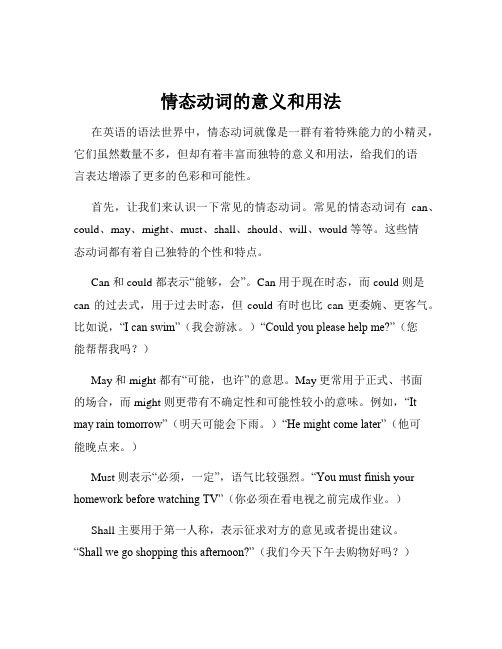
情态动词的意义和用法在英语的语法世界中,情态动词就像是一群有着特殊能力的小精灵,它们虽然数量不多,但却有着丰富而独特的意义和用法,给我们的语言表达增添了更多的色彩和可能性。
首先,让我们来认识一下常见的情态动词。
常见的情态动词有can、could、may、might、must、shall、should、will、would 等等。
这些情态动词都有着自己独特的个性和特点。
Can 和 could 都表示“能够,会”。
Can 用于现在时态,而 could 则是can 的过去式,用于过去时态,但 could 有时也比 can 更委婉、更客气。
比如说,“I can swim”(我会游泳。
)“Could you please help me?”(您能帮帮我吗?)May 和 might 都有“可能,也许”的意思。
May 更常用于正式、书面的场合,而 might 则更带有不确定性和可能性较小的意味。
例如,“It may rain tomorrow”(明天可能会下雨。
)“He might come later”(他可能晚点来。
)Must 则表示“必须,一定”,语气比较强烈。
“You must finish your homework before watching TV”(你必须在看电视之前完成作业。
)Shall 主要用于第一人称,表示征求对方的意见或者提出建议。
“Shall we go shopping this afternoon?”(我们今天下午去购物好吗?)Should 有“应该”的意思,常用来给出建议或表达责任、义务。
“You should exercise more to keep healthy”(你应该多锻炼来保持健康。
)Will 和 would 用于表示意愿和决心。
Will 用于现在和将来,would是 will 的过去式,同时 would 也更委婉。
“I will study hard”(我会努力学习。
英语语法:“情态动词+完成式”的用法
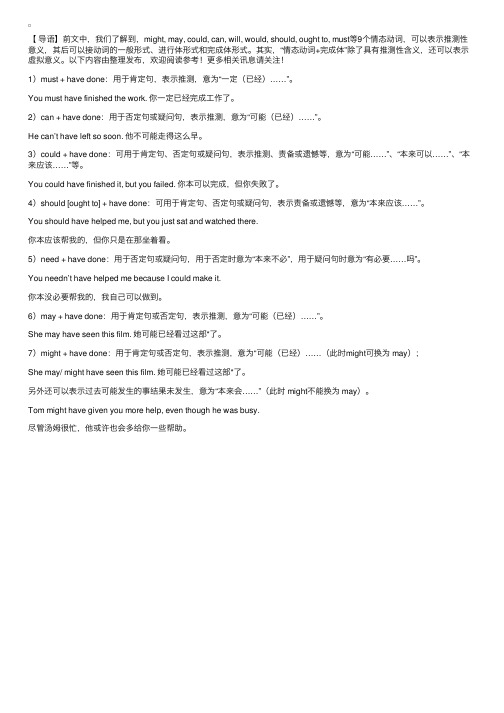
【导语】前⽂中,我们了解到,might, may, could, can, will, would, should, ought to, must等9个情态动词,可以表⽰推测性意义,其后可以接动词的⼀般形式、进⾏体形式和完成体形式。
其实,“情态动词+完成体”除了具有推测性含义,还可以表⽰虚拟意义。
以下内容由整理发布,欢迎阅读参考!更多相关讯息请关注!1)must + have done:⽤于肯定句,表⽰推测,意为“⼀定(已经)……”。
You must have finished the work. 你⼀定已经完成⼯作了。
2)can + have done:⽤于否定句或疑问句,表⽰推测,意为“可能(已经)……”。
He can’t have left so soon. 他不可能⾛得这么早。
3)could + have done:可⽤于肯定句、否定句或疑问句,表⽰推测、责备或遗憾等,意为“可能……”、“本来可以……”、“本来应该……”等。
You could have finished it, but you failed. 你本可以完成,但你失败了。
4)should [ought to] + have done:可⽤于肯定句、否定句或疑问句,表⽰责备或遗憾等,意为“本来应该……”。
You should have helped me, but you just sat and watched there.你本应该帮我的,但你只是在那坐着看。
5)need + have done:⽤于否定句或疑问句,⽤于否定时意为“本来不必”,⽤于疑问句时意为“有必要……吗”。
You needn’t have helped me because I could make it.你本没必要帮我的,我⾃⼰可以做到。
6)may + have done:⽤于肯定句或否定句,表⽰推测,意为“可能(已经)……”。
She may have seen this film. 她可能已经看过这部*了。
如何正确使用情态动词

如何正确使用情态动词?情态动词(Modal Verbs)在英语中起到了重要的语法和语义作用。
它们用于表达说话人的态度、情感、意愿、推测、能力、建议等。
以下是关于如何正确使用情态动词的一些指导原则:1. 情态动词的基本特点:-情态动词没有人称和数的变化,后面不加-s或-ed。
-情态动词后面跟动词原形(不带to)。
-情态动词没有时态变化,可以通过上下文来确定所表示的时间。
2. 表示能力、能力和允许:- Can: 表示能力或可能性。
例如:"I can play the guitar."(我会弹吉他。
)- Could: 表示过去的能力、可能性或礼貌的请求。
例如:"He could swim when he was five."(他五岁时就会游泳。
)- May/Might: 表示允许或可能性。
例如:"You may go now."(你可以走了。
)3. 表示意愿、建议和推测:-Will/Would: 表示意愿、决心、承诺或习惯性行为。
例如:"I will help you with your homework."(我会帮你做作业。
)- Shall/Should: 表示建议、义务或推测。
例如:"You should study for the exam."(你应该为考试学习。
)- Must: 表示强烈的意愿、责任或推测。
例如:"We must finish this project by tomorrow."(我们必须在明天之前完成这个项目。
)4. 表示推测、可能性和条件:- Can/Could/May/Might: 表示推测和可能性。
例如:"He can be at home."(他可能在家。
)- Must: 表示强烈的推测和肯定性。
例如:"She must be tired."(她一定累了。
- 1、下载文档前请自行甄别文档内容的完整性,平台不提供额外的编辑、内容补充、找答案等附加服务。
- 2、"仅部分预览"的文档,不可在线预览部分如存在完整性等问题,可反馈申请退款(可完整预览的文档不适用该条件!)。
- 3、如文档侵犯您的权益,请联系客服反馈,我们会尽快为您处理(人工客服工作时间:9:00-18:30)。
情态动词+完成时的语法意义(二)
三、can/could have done的用法
1.can/could have done表示“对过去的可能性推测”,could的语气较can弱。
该结构表推测时无肯定式,一般用于否定句和疑问句。
否定句表示“过去不可能发生过某事”,它是must have done的否定式;疑问句表示“过去可能发生过某事吗”。
例如:
He can’t have forgotten it.他不可能已忘记此事。
Can he have gone to his aunt’s? 他有可能到他姑姑家去了吗?
I saw Mr. Zhang just now and he couldn't have gone to Beijing.我刚才看见张先生了,他不可能去了北京。
Why does he know this? Could someone have told him about it? 他怎么知道? 会是哪个人告诉他了吗?
We could not have heard them because of the noise from the river. 由于有河水声我们不能听见他们的话。
Can he have left already? 他会已经离开了吗?
They can’t have gone out because the light is on. 他们不可能出去了,因为灯还亮着。
注意:在非正式英语或口语中,偶见到could have done也可用于肯定句,表示推测:
She could have forgotten to tell him. 她可能忘记告诉他了。
Tom could have taken the money; he was here alone yesterday. 有可能是汤姆把钱拿走了,昨天他单独一个人在这里呆过。
In the example mentioned above, either method of construction could have been used.在上面提到的例子中,两种建造方法均可能用过。
2. could have done 表示未曾实现的可能性
该结构仅限于使用could,不用can。
表示过去本来有能力、有可能、有打算、有选择做某事的,但实际上却没有那样做。
即“过去本来可能做某事,而实际没有做”。
通常译为“本来可以”,“本来能够”等。
例如:
You could have done better, but you didn't try your best.你本可能做得更好,但你没有尽力。
We could have got in for nothing—nobody was collecting tickets. 我们本可以不买票就进去——根本没人收票。
I could have passed my examination easily but I made too many stupid mistakes. 我本可以轻易通过考试,但我犯了太多不该犯的错误。
You could have stayed with me when you were in this city on business.在这个城市出差时你本能够和我住在一起的。
She could have been seriously injured. 她本来可能伤得很重的。
It’s difficult enough, but it cou ld have been worse. 这事情够困难的了,本来可能会更糟呢!
I could have given you some hints, but I suppose you thought yourself too grand. 我本可以给你点提示的,但是我认为你太自负了。
I could have lent you the money. Why didn’t you ask me? 我本来可以借这笔钱给你的,你为什么不向我提出?
You needn’t have walked up; you could have taken the lift. 你没必要走着上去,你本来可以乘电梯的。
有时,也可根据语境译为“好在没有”,“差点”,尤其是当谈论的是不利情况时。
如:
She felt miserable. She could have cried. 她感到很痛苦,她差点哭了。
That was a bad place to go skiing—you could have broken your leg. 那不是一个滑雪的好地方,好在你没有把腿给摔断。
Why did you throw the bottle out of the window? Somebody could have been hurt. 你为什么把瓶子扔出窗外呢? 好在没有砸伤人。
3. could have done除了含有上述的意思外,还表示批评或责备
即表示过去本来有责任或义务应该做某事的,但实际上却没有做成,含有批评和责备的意味,通常译为“本来应该”,“本来可以”等,用法同上。
例如:
You could have helped me—why did you just sit and watch? 你本来可以帮我一把嘛——为什么你只是坐在那儿观望呢?
I am disappointed that you didn’t tell me. You should have told me. 你没告诉我,我感到很失望,你本来应该告诉我的。
4. could have done 用于虚拟语气
在虚拟条件句中,当谈论过去的情况时,其句型通常是:主句用“could/would/might +have+过去分词”,if从句用过去完成时。
例如:
You could have been killed if I hadn’t warned yo u. 我如不是警告了你,你就可能丧命了。
If he had known the facts, he could have told us what to do. 如果他了解事实,他是可能告诉我们怎样做的。
If you had come sooner, you could have helped us. 你如早来一点,就会帮上我们了。
I could have told them what happened if anybody had asked me. 如果有谁问过我,我可
以告诉他们发生了什么情况。
